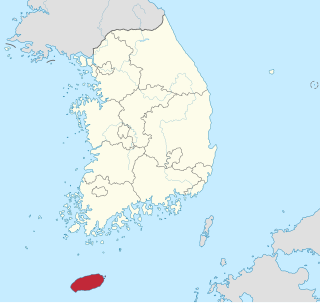
Back لغة جيجو Arabic Idioma jeju AST Idioma jeju Catalan Čedžuština Czech Γλώσσα Τζέτζου Greek Idioma jeju Spanish Jeju hizkuntza Basque زبان ججویی Persian Jeju (langue) French Lingua jeju Galician
| Jeju | |
|---|---|
| Jejueo, Jejuan | |
| 제줏말 / 제주말 Jejunmal / Jejumal | |
 | |
| Native to | South Korea |
| Region | Jeju Province |
| Ethnicity | Jejuans |
Native speakers | 5,000 (2014)[1] |
Koreanic
| |
Early forms | |
| Hangul | |
| Language codes | |
| ISO 639-3 | jje |
| Glottolog | jeju1234 |
| ELP | Jejueo |
 | |
Jeju (Jeju: 제줏말; Jeju RR: Jejunmal, or Korean: 제주어; RR: Jejueo, or 제주말; Jejumal), often called Jejueo or Jejuan in English-language scholarship, is a Koreanic language originally from Jeju Island, South Korea.[2] It is not mutually intelligible with mainland Korean dialects. While it was historically considered a divergent Jeju dialect of the Korean language, it is increasingly referred to as a separate language in its own right. It is declining in usage and was classified by UNESCO in 2010 as critically endangered, the highest level of language endangerment possible. Revitalization efforts are ongoing.
The consonants of Jeju are similar to those of Seoul Korean, but Jeju has a larger and more conservative vowel inventory. Jeju is a head-final, agglutinative, suffixing language like Korean. Nouns are followed by particles that may function as case markers. Verbs inflect for tense, aspect, mood, evidentiality, relative social status, formality, and other grammatical information. Korean and Jeju differ significantly in their verbal paradigms. For instance, the continuative aspect marker of Jeju and the mood or aspect distinction of many Jeju connective suffixes are absent in Korean. Most of the Jeju lexicon is Koreanic, and the language preserves many Middle Korean features and words now lost in Standard Korean.[3][4] Jeju may also have a Peninsular Japonic substratum, but this argument has been disputed.[5]
Jeju was already divergent from the Seoul dialect of Korean by the fifteenth century and unintelligible to mainland Korean visitors by the sixteenth century. The language was severely undermined by the aftermath of the Jeju uprising of 1948, the Korean War, and the modernization of South Korea. Many fluent speakers remaining in Jeju Island are now over seventy years old. Most people in Jeju Island now speak a variety of Korean with a Jeju substratum. The language may be somewhat more vigorous in a diaspora community in Osaka, Japan, as many Jeju people migrated to Osaka in the 1920s, but even there, younger members of the community tend to speak Japanese.
- ^ Jeju at Ethnologue (18th ed., 2015) (subscription required)
- ^ Olko, Justyna; Sallabank, Julia (29 April 2021). Revitalizing Endangered Languages: A Practical Guide. Cambridge University Press. ISBN 978-1-108-48575-3.
- ^ Stonham, John (2011). "Middle Korean Δ and the Cheju dialect". Bulletin of the School of Oriental and African Studies, University of London. 74 (1): 97–118. ISSN 0041-977X. Retrieved 31 December 2024.
- ^ Ko J. 2011a, pp. 259–270.
- ^ Lee, Seungjae (2017). The old Korean Language Inscribed on Wooden Tablets (in Korean). Seoul, Korea: Ilchokak. ISBN 9788933707364.